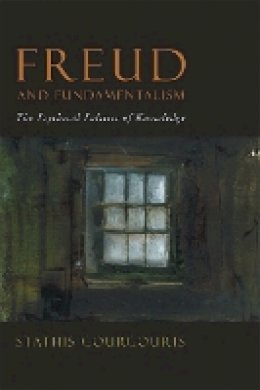11%OFF

Stock image for illustration purposes only - book cover, edition or condition may vary.
Freud and Fundamentalism: The Psychical Politics of Knowledge
Stathis Gourgouris
€ 37.99
€ 33.87
FREE Delivery in Ireland
Description for Freud and Fundamentalism: The Psychical Politics of Knowledge
Paperback. A work by the author of "Does Literature Think?" "Literature as Theory for an Antimythical Era" and "Dream Nation: Enlightenment, Colonization, and the Institution of Modern Greece". Editor(s): Gourgouris, Stathis. Num Pages: 224 pages. BIC Classification: JMAF. Category: (UP) Postgraduate, Research & Scholarly; (UU) Undergraduate. Dimension: 228 x 154 x 16. Weight in Grams: 374.
At the heart of this volume are questions about the psychic components of the modes of thinking we call “fundamentalist”—that is, thinking that disavows multiplicities of meaning, abhors allegorical elements, and strives toward an exclusionary orthodoxy that codifies not just its own world but that of its adversaries, its
others. The essays address transcendentalist orthodoxies of all kinds, whether religious or secularist. Fundamentalist elements in psychoanalysis itself are also placed in question, at the same time as psychoanalytic thinking and practice is explored as a mode of knowledge that ultimately unravels fundamentalist tendencies.
The texts in this collection ... Read more
Product Details
Format
Paperback
Publication date
2010
Publisher
Fordham University Press United States
Number of pages
224
Condition
New
Number of Pages
224
Place of Publication
New York, United States
ISBN
9780823232246
SKU
V9780823232246
Shipping Time
Usually ships in 7 to 11 working days
Ref
99-1
About Stathis Gourgouris
Stathis Gourgouris is Professor of Comparative Literature and Society at Columbia University. His most recent book is The Perils of the One (Columbia, 2019).
Reviews for Freud and Fundamentalism: The Psychical Politics of Knowledge
"The key contribution of the volume is to combat our fundamentalist tendencies in thinking about fundamentalism. The essays collected by Gourgouris throw the meanings of fundamentalism open and make of it a newly vital term for secular criticism. The debates this book engages are global and urgent, even though its key figure-Freud-is neither."
-Eva Badowska Fordham University
-Eva Badowska Fordham University
